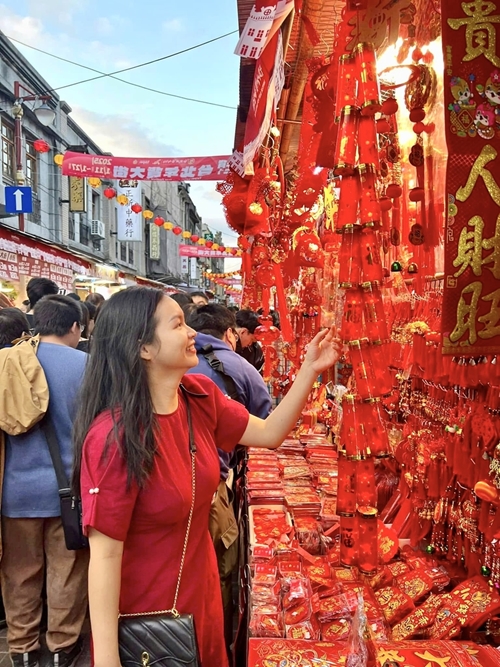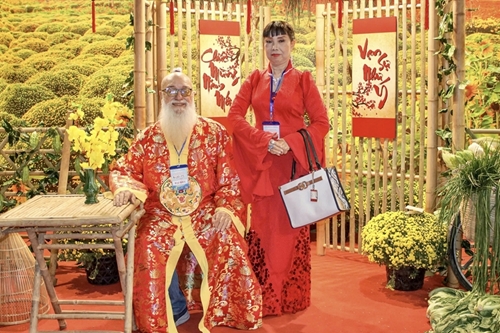For Master, Doctor Huynh Ngoc Hung, aged 40, living in the U.K., traditional Tet for those living away from the motherland is really special, sacred, and profound. It is a time to reminisce about the homeland, like a film rewinding beautiful memories, such as the image of the reunion dinner on the New Year's Eve, the taste of banh chung made by mom, the warm smoke from grandma's kitchen, or the sound of firecrackers on the New Year's Eve.
Hung has lived and worked in the U.K. for 11 years. The Tet atmosphere is still fresh in his mind as the Vietnamese community there often organizes meaningful activities during Tet.
    |
 |
|
The Vietnamese community in the RoK celebrates Tet at Hai Nguyen Pagoda. |
He said that his family joined hands in making banh tet (cylindrical sticky rice cakes) and bought a pair of banh chung (square sticky rice cakes). They also made pickles and pickled onions to give to neighboring Vietnamese, sharing a bit of the flavor of the homeland, and together welcoming a spring filled with love in a foreign land.
The Vietnamese community in the U.K. often gather in pagoda, community center or private houses to give each other lucky money, chat and taste dishes from the homeland, as if to convey a bit of the warmth of their roots and close bond, recreating the cozy atmosphere of the homeland.
According to Dr. Hung, Vietnamese in the U.K. always stay ready to assist each other and together surmount challenges. No matter where they are, their hearts still turn to the homeland and promise to meet again on the beloved land of Vietnam one day in the near future.
This year, his family and he returned home to welcome Tet. For him, Tet is like a subtle reminder, urging him and his loved ones to strive more to not miss the expectations of the homeland.
Living in Geoje city in Gyeongsang prefecture, the Republic of Korea (RoK), Ngo Xuan Quynh, aged 35, said that in the RoK, Vietnamese brides also pay Tet visits to families. Especially, they often visit Hai Nguyen Pagoda, a spiritual fulcrum and a common home for Buddhist followers and Vietnamese compatriots.
According to Quynh, Hai Nguyen Pagoda is nicely decorated during the Tet holiday, bringing the breath of the three regions of Vietnam with apricot trees, majestic Phuc Duyen tower next to the pine forest like Thien Mu Pagoda reflecting on the Huong River in Hue city, a row of bamboo trees, red lanterns, a pair of Tet parallel sentences, and a countryside market.
Although Quynh is busy with taking care of her small child, she still prepared banh chung, Vietnamese sausage and dried foods for Tet and visited a pagoda. She plans to visit the homeland next year to give chances for the kid to know how joyful the traditional Tet of Vietnam is.
    |
 |
|
Chung Thu Huong visits Dihua old quarter to buy Tet decorations. |
For Chung Thu Huong, aged 27, a student at Mingchuan University in Taiwan, China, said that her friends and she went shopping at Dihua old quarter to buy red parallel sentences and candied fruit. She also joined other Vietnamese in Taipei to make banh chung and other foods that are typical in Vietnamese Tet. This year, she celebrated Tet with her family virtually and wished them a happy and peaceful new year.
Falling in love with his wife in 2009 during his visit to Ho Chi Minh City, Pierre Sinel, aged 75 from New Zealand, said that he has step-by-step integrated and had close bond with Vietnamese culture and people and Vietnam now becomes his second homeland.
    |
 |
|
Pierre Sinel and his wife pose for a photo in the space imbued with traditional Tet of Vietnam at the meeting with OVs hosted by Ho Chi Minh City leaders in 2025. |
The son-in-law of Vietnam always participates in meetings with OVs annually hosted by Ho Chi Minh City leaders to welcome Tet and new spring. He loves wearing Ao dai for men and is proud of the traditional costumes of Vietnam. This year, with good health condition, he could immerse himself in the bustling atmosphere of Tet in the homeland of Vietnam, meet his family and friends, and feel like he is being recharged with the fresh energy of spring.
Pierre Sinel said that what impressed he most is the innovation of the homeland, seeing it increasingly developing, modernizing and constantly integrating, but still preserving its precious traditional beauty.
Translated by Mai Huong